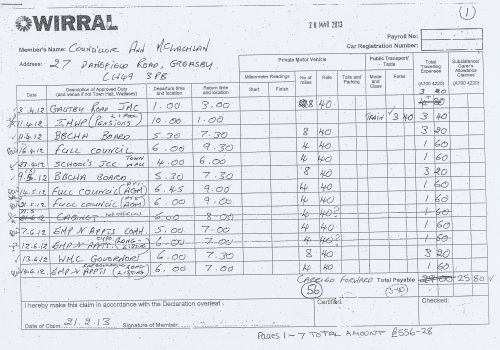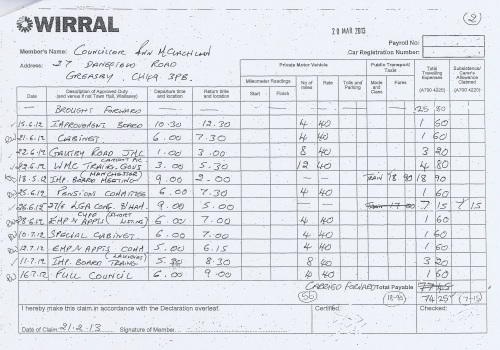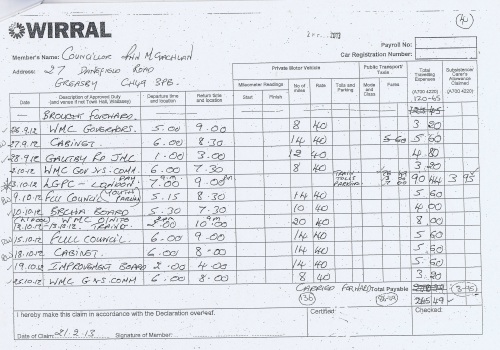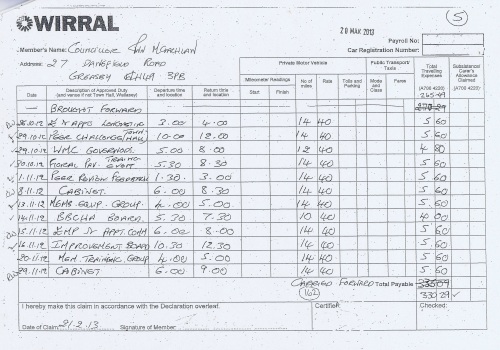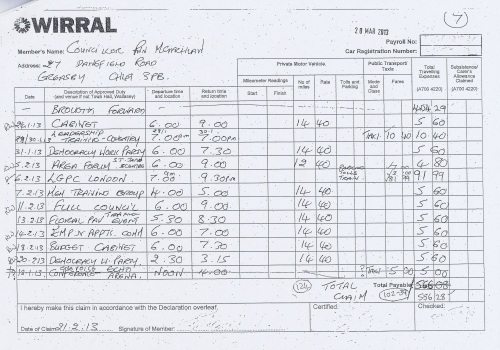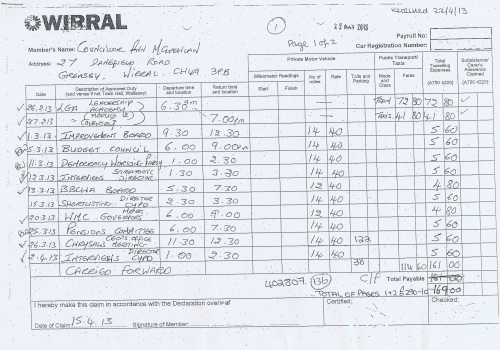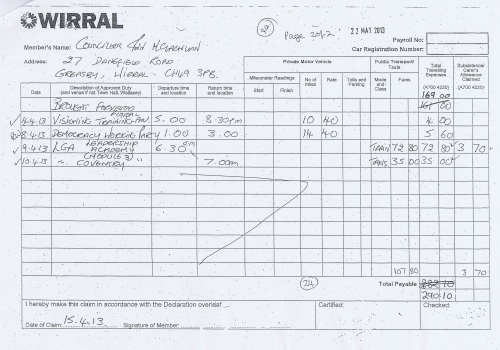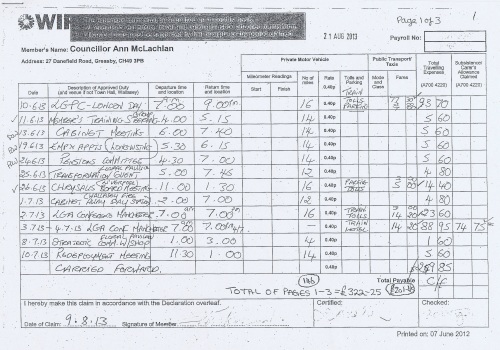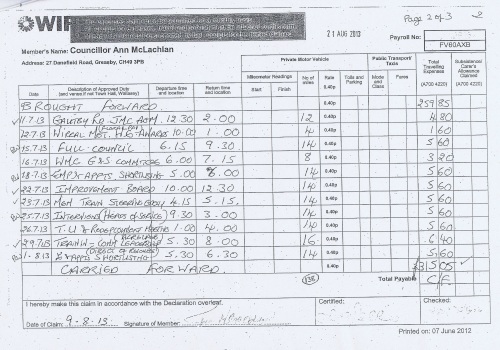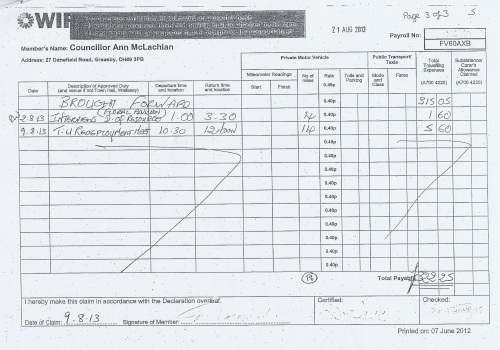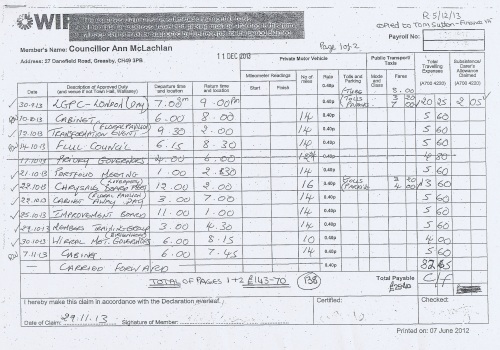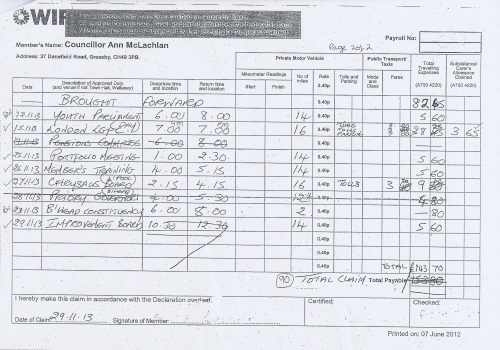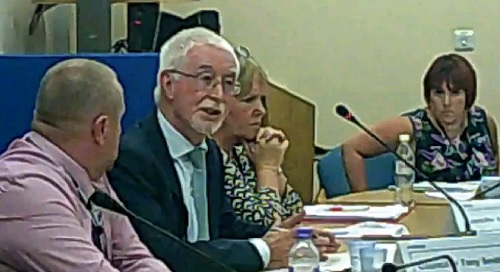Cllr Stuart “Robin Hood” Kelly takes on Cllr Phil “Sheriff of Nottingham” Davies on a matter involving Wirral’s forest

Please accept YouTube cookies to play this video. By accepting you will be accessing content from YouTube, a service provided by an external third party.
If you accept this notice, your choice will be saved and the page will refresh.
The following is meant as satire. Obviously Cllr Stuart Kelly is not Robin Hood and Councillor Phil Davies is not the Sheriff of Nottingham. You can watch the meeting from beginning to end, however the video clips below are of the part of the meeting described below that video clip.
Councillor Stuart “Robin Hood” Kelly had gone into Nottingham’sWirral’s castle as he disagreed with the plans of Cllr Phil “Sheriff of Nottingham” Davies. The plans Cllr Phil “Sheriff of Nottingham” had were about the Forest Schools and Healthy Homes programs.
Councillor Stuart “Robin Hood” Kelly regularly appeared in articles in the local newspaper the NottinghamWirral Globe and was known for being a “thorn in the side” of the Sheriff.
In the recent past he had argued with the Sheriff as the Sheriff was charging the poor peasantspeople (who didn’t have computers) of Wirral an extra £5 to have their garden rubbish removed in brown bins. The Sheriff had disagreed with Cllr Stuart “Robin Hood” Kelly then. As far as the Sheriff was concerned, the bins tax was fair (and although not stated obviously fairer than the bedroom tax which the Sheriff was against).
After the Sheriff had heard at a meeting recently that any of the peasantspeople of Wirral could go into one of its many 24 libraries (on which a consultation on reducing the opening hours was now taking place on the orders of the Sheriff) and sign up to pay the “bin tax” online (completely failing to mention the irony of Cllr Foulkes’ plan to close half of the libraries which was stopped a few years ago by Sue Charteris, the Labour government and the people of Wirral).
One of the Sheriff of Nottingham’s colleagues Cllr Moira McLaughlin of Rock Ferry (who is not Maid Marian despite also having the initials MM) told Cllr Stuart “Robin Hood” Kelly that he had five minutes only to make his case. Thankfully she did not add that if he exceeded his time she would call the guards of the castle and have him dragged off to the dungeon (formerly the Mayor’s wine cellar) for having the gall and brass neck to try to upset the Sheriff.
Cllr Stuart “Robin Hood” Kelly of Oxton explained the many hardships the peasantspeople were suffering. He wanted the children of Wirral to visit the forests! He wanted the people to have warm homes and not be cold in the winter ahead! He was doing this all for the people! He disagreed with Cllr Phil “Sheriff of Nottingham” Davies as he felt that it was wrong to try to stop or cut how much was spent on these matters as if they did the people would suffer!
Cllr Moira McLaughlin of Rock Ferry then called Cllr Phil “Sheriff of Nottingham” to speak, again for up to five minutes.
Cllr Phil “Sheriff of Nottingham” Davies was keen to show he wasn’t as bad as Cllr Stuart “Robin Hood” Kelly had painted him earlier. He blamed it all on Prince John Queen Elizabeth II and the Coalition government. He explained that the Forest Schools target was to send 660 children to the forests of Nottingham Wirral over the last two years. In fact at the end of year one it had exceeded its target! Therefore this was why the money was taken away. Yes, classes of fifteen, instead of thirty were now being used but this was all for the be benefit of the children! It was his contention that both on Healthy Homes and Forest Schools that this was prudent financially.
Cllr Moira McLaughlin of Rock Ferry then asked for the witnesses to be called. A senior manager of the forests of Wirral came to speak. She explained what the Forest Schools program was about and how it was run by the rangers. They had decided that classes of fifteen were the best size. The experienced rangers were running the program, with the money used to backfill their positions.
Cllr Mike Sullivan of Pensby & Thingwall said how fabulous the work of the Forest Schools was and how it was better now it was fifteen and not thirty.
Another councillor asked if the budget was cut. The senior manager of the forests confirmed it had. Cllr Moira of Rock Ferry referred to a “reduction in activity” followed by Cllr Mike Sullivan again.
Cllr Janette Williamson of Liscard described it as a “great project”.
Please accept YouTube cookies to play this video. By accepting you will be accessing content from YouTube, a service provided by an external third party.
If you accept this notice, your choice will be saved and the page will refresh.
The effect on the children was talked about as well as how it made a “voluntary mute” “chatty and enthusiastic”. However the officer warned of the effect on places like Bidston Hill which was suffering whilst its ranger was doing this.
Cllr Dave Mitchell of Eastham asked a question about £18,000? The officer replied that was the underspend in year one. She continued talking about the beneficial effects on the young children and the benefits of it, not just on the children but on others too. The reduction in early years involvement in the Forest Schools program from four events to two was referred to. Various people asked questions and the debate went on.
Cllr Mike Sullivan of Pensby & Thingwall referred to the fact they might have to lay off rangers, to a rather horrified look from Cllr Moira of Rock Ferry who intervened. How much each schools paid to be involved was mentioned, with the poor schools paying less than the richer schools.
Cllr Paul Doughty of Prenton referred to the benefits, a decrease in school absence, increase in outdoor use and exercise and other benefits. The manager replied. She was thanked by Cllr Moira of Rock Ferry who then asked the Healthy Homes witness to come forward.
Lisa told everybody about what the Healthy Homes program was, how it was about healthy lifestyles, smoking cessation and a “whole house” approach (whatever that means). She referred to the NHS, training “champions” and “partner agencies” as well as grants and loans that could be provided to tackles hazards.
Cllr Mitchell of Eastham referred to Merseyside Fire and Rescue Service. The manager referred to “significant progress” as well as the police service and fire service. He asked her another question and she said she could only speak for Wirral Council. Cllr Mitchell of Eastham asked another question.
Cllr Berry of Moreton West and Saughall Massie asked about the budget cut and when she had been told? Had she been asked for comments about the potential impacts? He referred to numbers of assessments done.
The answer given referred to housing renovation loans, central heating and grants. Cllr Janette Williamson of Liscard indicated her question had already been answered. Cllr Paul Doughty of Prenton referred to a presentation last year of Ian Platt about the Healthy Homes program and funding. The manager replied to his points using phrases such as that they could “still help everyone”.
Cllr Mike Sullivan of Pensby & Thingwall said the manager was not “Mystic Meg”. Cllr Moira of Rock Ferry thanked the witness and called Kevin Adderley.
Kevin Adderley said he was “very pleased” and that the two schemes he was “proud of”. He went into detail about the impacts of the Forest Schools and Healthy Homes programs and referred to the Chief Executive’s Strategy Group.
Cllr Mitchell of Eastham asked why he had selected these to be earmarked for savings and why wasn’t the money capitalised?
Kevin Adderley answered that was explained in the Cabinet Report. He went into a little more detail. Mitchell of Eastham asked another question, Kevin Adderley again referred to the Chief Executive’s Strategy Group.
Cllr Moira McLaughlin of Rock Ferry made a point, Cllr Wendy Clements of Greasby, Frankby & Irby referred to all the people who could be helped. Kevin Adderley replied that it was in privately owned accommodation, not registered social landlord and that they couldn’t be expected to knock on 100,000 doors on the Wirral, they had to rely on people coming forward.
Cllr Wendy Clements of Greasby, Frankby & Irby referred to that they were in danger of disadvantaging people and that they should be proactive. Kevin Adderley replied that he was sure they wouldn’t want to advertise to private sector landlords and that there was a “fine balance”.
Cllr Paul Doughty of Prenton referred to the “age of austerity” and that he could only think in terms of his own household’s budget. He disagreed with capitalising the expenditure and referred to cuts and the “prudent financial management” and that they shouldn’t be finding ways of spending money that they haven’t got.
Please accept YouTube cookies to play this video. By accepting you will be accessing content from YouTube, a service provided by an external third party.
If you accept this notice, your choice will be saved and the page will refresh.
Cllr Moira McLaughlin of Rock Ferry asked Fiona Johnstone to come forward as a witness. Fiona Johnstone said she would take questions, but in answer to an earlier question about process it had first been agreed with the Cabinet portfolio holder. Kevin Adderley left for two minutes at this point. She continued by explaining the history of it all and when things had happened and would happen. Kevin Adderley returned. Fiona Johnstone continued on about Forest Schools and other matters. Mitchell of Eastham referred to the benefits to the children. Fiona Johnstone replied that there would be a full evaluation in May or June. However in her view the question was what could they afford to do more efficiently followed by talking about outcomes. Cllr Mitchell of Eastham referred to the review. Cllr Moira of Rock Ferry interrupted.
Cllr Wendy Clements of Greasby, Frankby & Irby referred to the fact it was public health money. Fiona Johnstone answered that they were waiting till the call in was complete. Cllr Anita Leech of Leasowe and Moreton East referred to the Cabinet minute about public health spending. Fiona Johnstone replied that they had monthly reports on the budget and in answer to a question as to whether these monthly financial reports went to the Families and Wellbeing Policy and Performance Committee the answer was “not now”.
Cllr Gerry Ellis of Hoylake and Meols asked a question. The answer given by Fiona Johnstone was that every project had been asked to make an assessment of the impact and those assessments had been received. Cllr Gerry Ellis of Hoylake and Meols asked if that was a written assesment? Fiona Johnstone replied that it was for 38 projects. Cllr Phillip Brightmore of Pensby & Thingwall asked a brief question to which Fiona Johnstone referred to that there would be a need to understand a proper evaluation.
Please accept YouTube cookies to play this video. By accepting you will be accessing content from YouTube, a service provided by an external third party.
If you accept this notice, your choice will be saved and the page will refresh.
Cllr Moira McLaughlin of Rock Ferry asked Cllr Stuart “Robin Hood” Kelly to sum up in five minutes. Cllr Stuart “Robin Hood” Kelly referred to the ringfencing of the money for public health. He said that the Forest Schools was “knocked into a cocked hat” and was a “victim of its own success”. Cllr Stuart “Robin Hood” Kelly referred to the reduction in class sizes from thirty to fifteen and referred to the Healthy Homes scheme.
He was interrupted by others, but Cllr Moira of Rock Ferry told him to “carry on”.
Cllr Stuart “Robin Hood” Kelly referred to substandard housing and how it had nothing to do with next year’s deficit. He questioned the stability of this year’s budget and how they could say that reducing to fifteen in each class for Forest Schools was a “success”? He referred to twenty-one households who would be affected by Healthy Homes and that how they need to think about priorities as these were small amounts of money.
Cllr Moira McLaughlin of Rock Ferry asked Cllr Phil “Sheriff of Nottingham” Davies to speak for five minutes.
He thanked Cllr Moira McLaughlin, said the project was a pilot project time limited to two years but that it was “something new” and “not a precise science”. Cllr Phil “Sheriff of Nottingham” Davies was not surprised that they had not been able to spend their total amount of funding. In the case of Forest Schools and Health Homes he felt it was “financially sensible” to make savings and think about “how best to use the money”.
He then went to refer to “savage cuts” and how Cllr Stuart “Robin Hood” Kelly was asking for the original budgets to be restored. Even if he did restore the budget he didn’t think it could be spent by 31st March 2015 as the rangers wouldn’t have the spare capacity, he even went so far as to use the word “nonsense”.
In closing he said he would like to see the projects continue, referred to them as “fantastic” and what’s needed was an “enlightened government” (in reference to cuts). He asked Cllr Stuart “Robin Hood” Kelly to join him in a lobby on the train to number 10 Downing Street to endorse the position of the Cabinet.
Cllr Moira McLaughlin of Rock Ferry asked if anyone wanted to debate it. Cllr Gerry Ellis of Hoylake and Meols left.
Cllr Jerry Williams of Bebington said that the Council was “working well” in “difficult circumstances” and that he knew Cllr Stuart “Robin Hood” Kelly was an “opposition councillor”. He wanted to dwell on the positives rather than being totally negative.
Cllr Wendy Clements of Greasby, Frankby and Irby said that it was public health money and they had to remember that it was nothing to do with the challenges.
Cllr Anita Leech of Leasowe and Moreton East referred to the ringfencing of the money and how the best number of class sizes was fifteen for the Forest Schools program. Cllr Dave Mitchell of Eastham referred to the Forest Schools project being an “excellent project”. Cllr Gerry Ellis of Hoylake and Meols returned. Cllr Dave Mitchell of Eastham continued by referring to what Ed Miliband and the Labour Party’s spokesperson had said would happen if they were elected in May 2015 and how they would not change anything. He referred to how the Forest Schools program was allowing young people to improve their lives.
Cllr David Elderton of West Kirby and Thurstaston referred to the concerns of Wendy Clements and the ringfencing of the money and that they should leave it alone and not throw the “baby out with the bath water”. Cllr Phillip Brightmore of Pensby and Thingwall referred to the money.
Cllr Moira of Rock Ferry referred to Cllr Paul Doughty’s resolution and the three options they had. However the middle one wasn’t applicable. They could refer the matter back to Cabinet or agree to uphold the original decision.
Cllr Paul Doughty of Prenton move a recommendation congratulating officers and referring to “prudent financial management”. His recommendation was that the Cabinet decision of 7th July 2014 would stand. Cllr Moira of Rock Ferry seconded it.
An amendment was moved by Cllr Wendy Clements of Greasby, Frankby and Irby. The amendment was to refer it back to the Cabinet asking them to be careful to evaluate the use of ringfenced funds and retain the projects. This was seconded.
There was a vote on the amendment.
For the amendment (6): Cllr Dave Mitchell, Cllr Bruce Berry, Cllr Gerry Ellis, Cllr David Elderton, Cllr Steve Williams and Cllr Wendy Clements.
Against the amendment (9): Cllr Janette Williamson, Cllr Jerry Williams, Cllr Michael Sullivan, Cllr Walter Smith, Cllr Christina Muspratt, Cllr Anita Leech, Cllr Phillip Brightmore, Cllr Paul Doughty and Cllr Moira McLaughlin.
The amendment was lost.
Voting on the original recommendation.
For the recommendation (9): Cllr Janette Williamson, Cllr Jerry Williams, Cllr Michael Sullivan, Cllr Walter Smith, Cllr Christina Muspratt, Cllr Anita Leech, Cllr Phillip Brightmore, Cllr Paul Doughty and Cllr Moira McLaughlin.
Against the recommendation (6): Cllr Dave Mitchell, Cllr Bruce Berry, Cllr Gerry Ellis, Cllr David Elderton, Cllr Steve Williams and Cllr Wendy Clements.
The recommendation was won and the nine Labour councillors voted to uphold the original decision of the Labour Cabinet (which is led by Cllr Phil “Sheriff of Nottingham” Davies).
The original Cabinet decision of the 7th July 2014 upheld by a majority vote (the call in related to section (5) of the original decision) was:
RESOLVED: That
Revenue:
(1) it be noted that at Month 2 (May 2014), the full year forecast projects a gross General Fund overspend of £3,137,000;
(2) the increased commitment of £152,000 for Carbon Reduction Commitment allowances contained within the above figure be noted;
(3) that the payment of New Homes Bonus grant of £242,253 which is a general grant received outside of directorate budgets be noted;
(4) the risks relating to non delivery of savings as detailed in paragraph 3.3 of appendix A and requirement for mitigation and actions to be identified be noted;
(5) the mitigation actions being undertaken including capitalisation, reprofiling and use of public health budgets as per paragraph 3.5 (of Appendix A) and reductions to 2014/15 growth as detailed in paragraphs 5.2 and table 5 above (of Appendix A). Further mitigation action will be developed as appropriate during the year;
(6) the application of the additional New Homes Bonus grant against the Carbon reduction commitment and overall overspend to reduce the net overspend to £2,894,747 be approved.
Capital:
(i) the spend to date at Month 2 of £1.3 million, with 16.7% of the financial year having elapsed be noted; and
(ii) the revised Capital Programme of £61.3 million (Table 1 at 3.1 of Appendix B) be approved.
If you click on any of the buttons below, you’ll be doing me a favour by sharing this article with other people.
